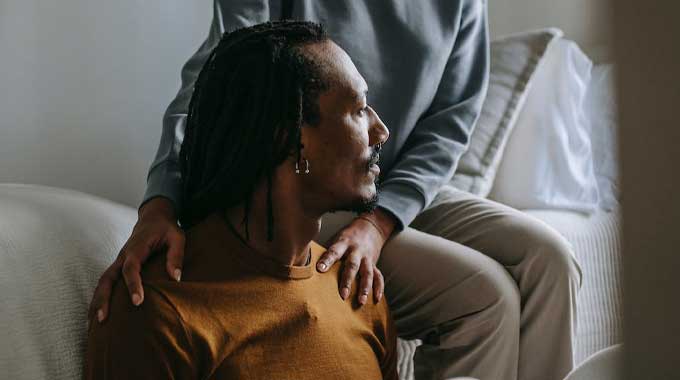It’s not unusual to feel chest pain after drinking alcohol, especially after a night of heavy drinking. However, you should take any alcohol-related chest pain seriously, especially as chest pain can be a symptom of various medical conditions.
If you experience chest pain after drinking alcohol, it’s essential to receive an accurate diagnosis from a professional.
Why Do I Have Chest Pain After Drinking Alcohol?
People who experience chest pain often assume that it originates in the heart. Sometimes it does – you may have heard of holiday heart syndrome, a non-medical term for the irregular heartbeat, breathlessness, or chest pain that some people experience after drinking alcohol. However, mild or severe chest pain has a range of possible causes, not all involving the heart.
Pain after drinking alcohol may be a direct result of excessive alcohol consumption, or it may signify the aggregation of a pre-existing condition. Below are some potential causes of alcohol-related chest pain. Remember to visit a medical professional to diagnose why you are experiencing chest pain.
Increased Blood Pressure
Drinking alcohol can increase blood pressure, leading to a variety of symptoms, including irregular heartbeat and chest pain. These symptoms are usually most intense during the hangover period.
Long-term alcohol abuse can lead to sustained high blood pressure, a major risk factor for a heart attack. High blood pressure can also result from obesity caused by calorie intake from alcohol.
Alcohol Cardiomyopathy
Alcohol consumption can cause your heart to expand and weaken, putting pressure on the surrounding blood vessels. This can lead to a disease of the heart muscle known as alcohol cardiomyopathy. In severe cases, the heart becomes too weak to pump blood efficiently, and fluid accumulates in parts of the body, which can result in heart failure.
There are various causes of cardiomyopathy – not all of them are alcohol-related. However, years of heavy drinking and alcohol abuse increase your chances of developing the disease, and consumption of alcohol can exacerbate pre-existing cardiomyopathy.
Alcohol-Induced Anxiety
Alcohol is a central nervous system depressant that works by slowing down activity in your brain. When you’re under the influence of alcohol, you may feel more relaxed and lack inhibitions.
However, the next day you may experience a rebound effect of heightened anxiety that can last for several hours. Some people even experience panic attacks after a heavy drinking session, causing chest pains or fear of a heart attack.
Gastroesophageal Reflux Disease (GERD)
GERD, also known as acid reflux disease, occurs when acid from your stomach flows back into your esophagus (the tube between your mouth and your stomach). While most people experience acid reflux occasionally, people suffering from GERD have at least one moderate to severe acid reflux attack each week (or at least two mild attacks).
Drinking alcohol increases the risk of GERD. Symptoms of GERD include heartburn, a burning sensation in your chest, and more general chest pain. If you are suffering from GERD, you may be able to ease symptoms with over-the-counter or prescription drugs.
Related article: Alcohol and sleep
Inflamed Pancreas
When you consume alcohol, your body begins to metabolize the substance. Metabolization involves breaking down a substance into smaller parts so it can be used or safely exit the body.
The liver and pancreas play significant roles in the metabolization of alcohol. However, since alcohol is a toxin, it can damage these organs in the process. Excessive drinking can cause inflammation of the pancreas, which can result in pain in the ribs and the stomach.
Mixing Substances
The interaction between alcohol and some medications or other drugs can lead to chest pain after drinking. Smoking is a lung irritant that can cause chest pain even when not drinking alcohol. Combining it with alcohol can lead to high blood pressure and exacerbate acid reflux disease.
Mixing alcohol with cocaine also strains your cardiovascular system. Taking the two substances together leads to the creation of a new metabolite called cocaethylene, which increases heart toxicity, increasing the risk of heart attack and stroke.
Can alcohol cause a heart attack?
Yes, alcohol can cause a heart attack. Heavy and long-term alcohol use can increase the risk of developing cardiovascular diseases, including coronary heart disease and heart attack. Alcohol can damage the heart muscle and increase blood pressure, which can lead to a heart attack. It can also contribute to the development of other risk factors for heart attack, such as obesity and high cholesterol. It is important to drink alcohol in moderation to reduce the risk of developing these and other health problems.
Can Alcohol Ever Be Good for the Heart?
Some scientific research suggests that people who drink very low amounts of alcohol may have lower blood pressure and a decreased risk of heart attack, stroke, and all-cause mortality compared to those who do not drink. However, these people may partake in other healthy lifestyle choices, like exercising and eating a balanced diet, which could explain the link.
Other studies have found that drinking in moderation can balance cholesterol levels and reduce blood clotting. This can help prevent arteries from becoming narrower and keep blood flow at a healthy level.
These benefits, however, only apply to low levels of alcohol consumption. The Centers for Disease Control and Prevention defines moderate drinking as consuming two beverages a day or less for men and one a day or less for women. If you experience chest pain after drinking alcohol, you are likely to be drinking much more than the recommended limits.
Even if alcohol is beneficial in low levels, excessive alcohol consumption is responsible for 5.3% of all global deaths each year. Many doctors would never recommend any level of drinking for health reasons.
If you experience alcohol-related chest pain, don’t ignore it. You may like to try taking an antacid, which can ease symptoms if the pain is caused by acid reflux. However, if this has no effect or you consistently experience chest pain, seek medical advice. Correctly diagnosing chest pain is important and can, in some cases, be life-saving.
Read more: what are some ideas for substance abuse group activities?
What Are the Symptoms of a Heart Attack?
Alcohol can lead to a sustained increase in blood pressure, a significant risk factor for a heart attack. If any of the following major symptoms persist for more than fifteen minutes, seek immediate emergency medical attention.
Major symptoms of heart attacks include:
- Breathing difficulties
- Severe chest pain (chest tightness, heavy pressure, or a crushing feeling)
- Pain that radiates to other parts of the body, particularly the shoulders, arms, and back
Other symptoms include:
- Anxiety
- Nausea
- Sweating
- Dizziness
How Can I Prevent Alcohol Chest Pain?
The simplest way to prevent alcohol chest pain is to stop drinking or reduce the amount you are drinking. Most people who have experienced chest pain after drinking alcohol are drinking more than the recommended level or have a history of alcohol abuse. In these cases, reducing your drinking can lead to a wide variety of health benefits and prevent chest pain.
Some people may experience chest pain even after drinking small amounts of alcohol. If you are prone to feeling anxious, even a couple of drinks can lead to anxiety-induced chest pain. You may like to stop drinking for a while until your anxiety improves or seek treatment for anxiety disorder.
If your pain is caused by acid reflux, you may be able to treat the pain with over-the-counter or prescription medicines.
Remember that alcohol chest pain can be a sign of severe health problems, and you should seek medical advice if you frequently experience it.
Return to the homepage: Rehab in Orange County
Alcohol Addiction and Dependence
It isn’t safe for people who have developed an alcohol use disorder to quit drinking alone. Going cold turkey can lead to life-threatening withdrawal symptoms known as delirium tremens (DTs). In addition, long-term abstinence can be incredibly difficult to sustain without proper treatment.
The good news is that there are many evidence-based treatments out there to help people recover from alcohol addiction and abuse.
Medical detox programs can help you safely reduce your drinking under the guidance of expert professionals. Addiction treatment programs combine treatment approaches like talk therapy and group programming to identify the underlying causes of alcohol addiction and help you overcome them. Self-organized recovery groups like Alcoholics Anonymous (AA) can also offer ongoing motivation and support in maintaining sobriety.
To Conclude
Contact us at Cornerstone addiction treatment center today for a free consultation if you think you may be struggling with alcohol addiction – or be at risk of developing it.
Our expert staff will offer specialist advice and answer any questions you may have. We deliver our services with compassion and treat each client with dignity and respect.






